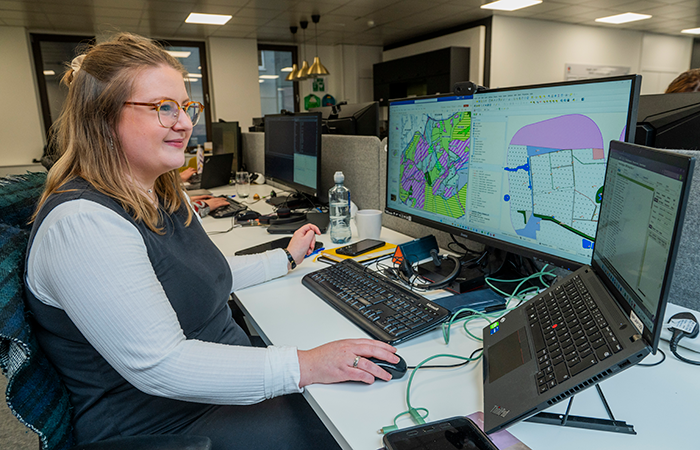Zoe Howell
When did you join Natural Power?
June 2018
What does your role entail?
My role sits within the Geospatial team at Natural Power, and predominantly focuses on the management and analysis of any spatial data, including survey data management, production of GIS figures and statistical analysis for reporting. I head up the data sub-team and we support Natural Power’s in-house ecology team (and external subcontractors) on the best method collecting methods and managing field data across various survey types, and then processing this information into several formats for different teams reporting, visual display or further analysis.

What are the most rewarding and challenging parts of your role?
The most rewarding aspect of my role is working across such a broad range of topics, and therefore with a real mix of people, both within Natural Power, with subcontractors and clients. A key element of my role is to help develop methodologies and investigate the best way to collect the correct information in the field to allow for complex analysis to be done later. This includes testing new technologies to facilitate this work, which has been incredibly exciting to see new developments in this field in recent years. The challenge is adapting (in sometimes very short timescales) to the ever-changing requirements for renewables, and how we support those in the field all the way through to those writing and submitting the application. As more and more renewable projects are approved, the pressure to fully understand cumulative impacts on wildlife is of increasing importance. Ensuring Natural Power is involved in these conversations, and can deliver the correct data collection and analysis, is key.
What is the most interesting project you have undertaken and why?
During my time at Natural Power, I was able to become involved in a project that was a collaboration between multiple international banks (IFS, EBRD and KfW) and another consultancy based in the US, called WEST. The project was to develop new guidance on monitoring bat and bird fatalities caused by onshore windfarms and overhead lines. This project sets a ‘good practice’ standard to encourage consistency in analysis, with the overall aim to eventually have much more comparable fatality rates, allowing a better understanding of impacts on a global scale. We were able to present this work as a full day workshop at CWW 2023 in Sibenik, Croatia, which was very well received.
Provide a hidden talent or quirky fact about yourself!?
I learned how to knit and crochet over Covid! I have now committed to conquering socks before this Christmas rolls round, so I have everyone’s presents covered…

